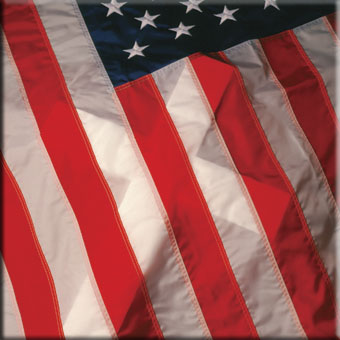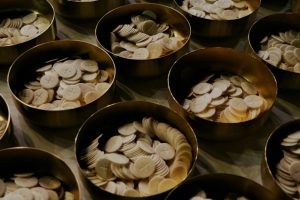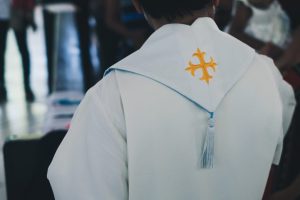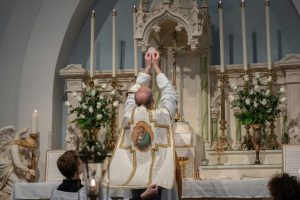UPDATE: The U.S. Catholic editors shared their reflections on being American Catholics last year. This year, we've asked readers to submit their own reflections. Please send 200-500 word reflections to onlineeditor@uscatholic.org by July 6. The best submissions will appear on our blog.
American Catholics make up almost a quarter of the country's population, and a diverse quarter of population it is. We include refugees, immigrants from everywhere, Native Americans, and families who trace their roots to the first settlers. We've been baptized at birth, age 90, and every age between. We like Gregorian chants, folk music, and Southern hymns. We belong to all the political parties from Tea to Green. In other words, we reflect America.
This Fourth of July–which happens to fall on the Lord's Day this year–join us in celebrating our country and our faith by sharing what it is that makes you proud to be an American Catholic. Below you'll find the reflections of U.S. Catholic editors and others at Claretian Publications (we'll be adding more throughout the week so check back). Add your own reflections in comments section.
(Editors' note: In the spirit of celebration and diversity, please only write why you are proud of being an American Catholic rather than questioning others' reasons! Thank you!)
Happy Fourth of July!
Cathy O'Connell-Cahill: Immigrant church and nation
 Last week my husband and I took our teenage daughter to Ellis Island, with a quick stopover at the Statue of Liberty (which, thank goodness, was already fully booked for climbs up into the sweltering interior). The guide took pains to relate how immigrants at the turn of last century would have felt on their arrival: thrilled to leave the ship and their seasickness behind, awed to see New York rising before them, apprehensive at whether they would actually be accepted into what they all called "America." They were fleeing unemployment, poverty, starvation, discrimination, police brutality, pogroms.
Last week my husband and I took our teenage daughter to Ellis Island, with a quick stopover at the Statue of Liberty (which, thank goodness, was already fully booked for climbs up into the sweltering interior). The guide took pains to relate how immigrants at the turn of last century would have felt on their arrival: thrilled to leave the ship and their seasickness behind, awed to see New York rising before them, apprehensive at whether they would actually be accepted into what they all called "America." They were fleeing unemployment, poverty, starvation, discrimination, police brutality, pogroms.
A large percentage of these Ellis Island arrivals, including my grandparents, were Catholic. They spread out across this country, finding work, bearing children, building parishes and Catholic schools, often facing discrimination here as well. The church gave them a home, a place to speak their own languages and educate their children in the faith. They got themselves elected to office and formed unions to fight for fair working conditions.
To be an American Catholic is to owe these men and women a debt for building the church that we inherit, with its strong body of social teaching. It was Cardinal James Gibbons, for example, whose parents came over from County Mayo, Ireland, who convinced Pope Leo XIII to throw the support of the church behind labor unions.
The arrival of the Ellis Island millions eventually set off an anti-immigrant movement, featuring prominent strains of anti-Catholicism, until immigration legislation slowed their arrival to a trickle in the 1920s. Today our Catholic Church leaders are catching heat, often from our own members, for standing with immigrants who have set off the latest wave of anti-immigrant venom. They simply arrived too late: Ellis Island is just a museum. The "Give me your tired, your poor" welcome will have to come from the Catholic Church, if no one else. Let our memories not be short this Fourth of July.
Megan Sweas: Part of the dialogue
 In eighth grade, I invited two friends to my confirmation: one was Jewish and the other Protestant. This is the context in which I'm proud to be Catholic. In America today, you are pretty likely to meet a fellow Catholic seeing as one fourth of us are Catholic, but you're more likely to meet somebody of another faith. Sure, there might be more religious diversity in other countries, but there's something about America that makes it a good place for interreligious dialogue. Perhaps it is that as an immigrant nation, people from all around the world bring their diverse religions-or even diverse traditions within the same religion-with them to the United States.
In eighth grade, I invited two friends to my confirmation: one was Jewish and the other Protestant. This is the context in which I'm proud to be Catholic. In America today, you are pretty likely to meet a fellow Catholic seeing as one fourth of us are Catholic, but you're more likely to meet somebody of another faith. Sure, there might be more religious diversity in other countries, but there's something about America that makes it a good place for interreligious dialogue. Perhaps it is that as an immigrant nation, people from all around the world bring their diverse religions-or even diverse traditions within the same religion-with them to the United States.
And though we are the largest Christian denomination and religion in the country, Catholics don't drown out conversation. We, it seems to me, make for great dialogue partners. Figures like Thomas Merton and St. Francis of Assisi, along with the intellectual tradition of the church, inspire me to learn about both my own and other faiths. Often it is through other faiths that I learn something about Catholicism. An added plus of my job: Merely mentioning where I work can start an interesting conversation, whether with family, friends, or people I've just met.
Bryan Cones: A democratic church?
 I once asked an Italian monk living in Syria why people didn't like the United States. Of the many good answers he gave, one that surprised me was simple. "We're jealous," he said, noting that Americans through the ballot box could change the course of the world-for better and worse. "You write a different name, and everything changes," he said.
I once asked an Italian monk living in Syria why people didn't like the United States. Of the many good answers he gave, one that surprised me was simple. "We're jealous," he said, noting that Americans through the ballot box could change the course of the world-for better and worse. "You write a different name, and everything changes," he said.
Democracy is one thing that makes America great, and something that makes me proud to be a part of it. But my Catholicism won't let me cast my ballot on national self-interest alone-I have the common good to think about, reminded by my 1 billion Catholic brothers and sisters, most of whom are not fellow U.S. citizens, along with the other billion Christians who share my baptism if not my nationality.
That's what I like about being an American Catholic (or a Catholic American): Each term has something to offer the other. The American spirit of democracy challenges a church wedded to feudal forms of government in ways that stifle creativity. But the Catholic concern for the common good reminds me that, despite what I think of as individual rights, I live in a global community that often feels the sting of my selfish choices. It isn't always easy, but it's never boring.
Meghan Murphy-Gill: Free for all
 My sister, mother, father, step-father, both grandfathers, two uncles, and three cousins have all served or are still serving in the United States military. I was born abroad on an Air Force base and baptized on one, but I could sing along to every lyric, guitar chord, and drumbeat to the song that goes "I'm proud to be an American, where at least I know I'm free" before I could get through the Creed without looking at a cheat sheet. I memorized all 50 state capitals before I could name the seven sacraments. And it was easier for me to distinguish between a fighter plane and a bomber than it was to explain the difference between St. Francis and St. Jerome.
My sister, mother, father, step-father, both grandfathers, two uncles, and three cousins have all served or are still serving in the United States military. I was born abroad on an Air Force base and baptized on one, but I could sing along to every lyric, guitar chord, and drumbeat to the song that goes "I'm proud to be an American, where at least I know I'm free" before I could get through the Creed without looking at a cheat sheet. I memorized all 50 state capitals before I could name the seven sacraments. And it was easier for me to distinguish between a fighter plane and a bomber than it was to explain the difference between St. Francis and St. Jerome.
When my family drove across the country to move from an Air Force base in New Hampshire to another in California, and I wrote poems about love for country. I recall feeling I enormously privileged to get a glimpse of America from sea to shining sea. For me, Genesis was the name of a band before it was a book of the bible, but in my childish verses, I noted the sheer gift of creation and I prayed that everyone in the world could experience such beauty and opportunity.
This sentiment is the one that sticks with me as an adult American Catholic: Nationality should not determine who gets to enjoy a life of abundance.














Add comment